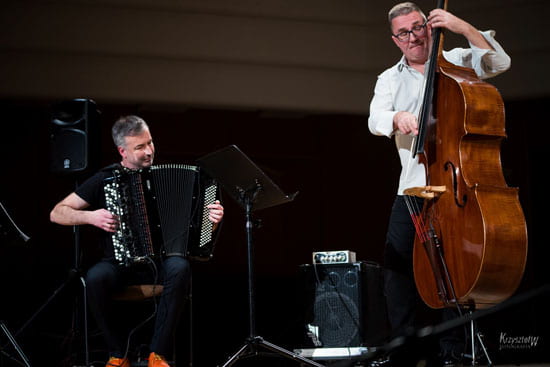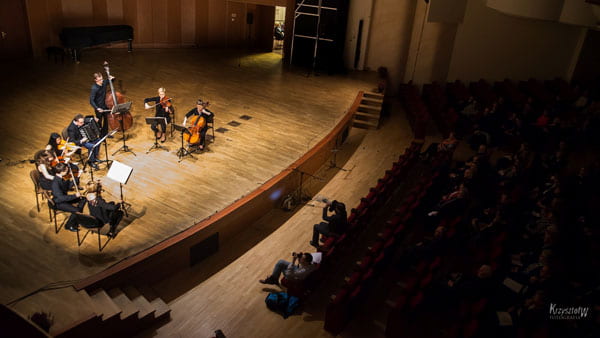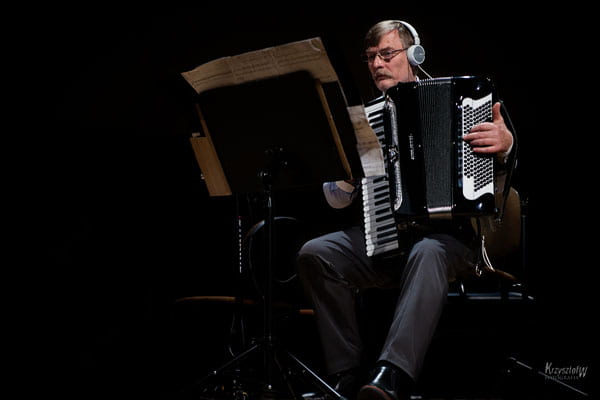The 40th anniversary of the Accordion Department at the Gdańsk Music Academy was celebrated November 25-26 with a scholarly conference and a series of concerts at the Academy’s attractive and acoustically-satisfying concert hall. The Nov. 25 concert opened with Krzysztof Olczak’s Chanson for Accordion and Electronic Sounds, a solo work performed by the composer. Olczak (below), who is also a virtuoso accordionist, has been associated with the Gdańsk Academy for over 37 years and was one of the organizers of the event. His Chanson uses a form of variations to explore a Renaissance French melody and intersperse it with various electronic and ambient sounds.
Next the 69 Duo—guitarist Marcin Kozioł and accordionist Szymon Jabłoński—gave a spirited and stylish reading of the Suite française for guitar and accordion by Piotr Moss. Their performance set the stage for the next chamber ensemble to use accordion—this time with violin and cello and a solo voice in an adaptation of five Schubert lieder. The soprano, Bożena Harasimowicz, displayed a truly fulsome voice that richly resonated throughout the concert hall, but often overwhelmed the German text. Elżbieta Rosińska’s accordion part added a lot of interesting textures, especially in the transcription of Gretchen am Spinnradeand in Heidenröslein. The strings, mostly the violin part, seemed superfluous in the remaining Schubert arrangements penned by someone listed in the program as “B. Cavanna,” perhaps also because of the timid and rather uncertain playing by violinist Małgorzata Skorupa.
The two show-stoppers closed the concert. First came on stage accordionist Cezary Paciorek with double bassist, Piotr Lemańczyk. They performed two of their own jazz compositions—Lifetime by Lemańczyk and You Will Be by Paciorek—with joy, abandon and much virtuosity. The applause of the audience, clearly appreciating the quite radical shift from Schubert, elicited an unnamed encore from the duo, probably also their own composition. One can look forward to their joint CD being released in coming weeks, as announced from the stage by the performers.

A very successful and riveting arrangement of Górecki’s Harpsichord Concerto Op. 40 closed the concert. It was a world premiere of the arrangement made by accordionist and Gdańsk Music Academy faculty, Paweł Zagańczyk. Wisely, he reduced the large string orchestra used by Górecki in his original score to a complement of four violins and one each of viola, cello and bass. Such an approach allowed for a better balance between the solo accordion (taking the original harpsichord part) and the rest of the ensemble. A huge ovation from the audience confirmed the success of this performance.

arr. Paweł Zagańczyk (world premiere).
The second concert, featuring students and alumni of the Gdańsk Music Academy was held on Saturday, Nov. 26, also in the Academy’s auditorium. It was a concert of solo and chamber music for the accordion, and most of it was very new and exciting, and quite demanding technically.
The evening began with the accordion orchestra of about 14 players busily engaged in a three-movement Divertimento by Krzysztof Naklicki. Written especially for the occasion, it was a world premiere of the work. Conducted by the composer, the piece found much favor with the audience who demanded an encore performance of the first movement.
The rest of the evening highlighted many young and very talented accordion students from the Gdańsk Academy. Marek Stawniak shone in a toccata-like Kaprys nr. 2 [Capriccio No. 2] by Mikołaj Majkusiak. Andrzej Tuchowski’s subtle and atmospheric Te lucis ante terminum found a sympathetic and able performer in Maciej Kacprzak. Piotr Skowroński shone in a technically brilliant and very demanding Fantasia 84 by Jurgen Ganzer. Maciej Zimka’s Solar Wind for violin, guitar and accordion was expertly delivered by Urszula Cieślak, Magdalena Hydzik and Wojciech Ulanowski.
Rafał Mieczkowski gave a spirited and deeply musical performance of Krzysztof Olczak’s Accotango and this evocative composition was followed by a violin-accordion duo of husband and wife, Krzysztof Lutrzykowski and Malwina Mikołajczak-Lutrzykowska in a deeply experimental Hunting for Violin and Accordion by Leszek Kołodziejski.
To continue the concert, Kamila Olas presented two solo works—Martin Lohse’s rather complex Menuetto and Jasper Koch’s esoteric Jabberwocky. Piotr Komorowski then gave a virtuoso reading of Zolotariow’s Finale from his Sonata No. 3 and the program ended with a duet by Benjamin de Murashkin’s Tango organico, a work of only passing interest that was played with much gusto and expertise by Kacper Trębacz and Marek Stawniak.
The audience for both concerts was as ample as it was enthusiastic and the performers conveyed a strong sense of professionalism and dedication that characterize the accordion studies at the Gdańsk Music Academy.
